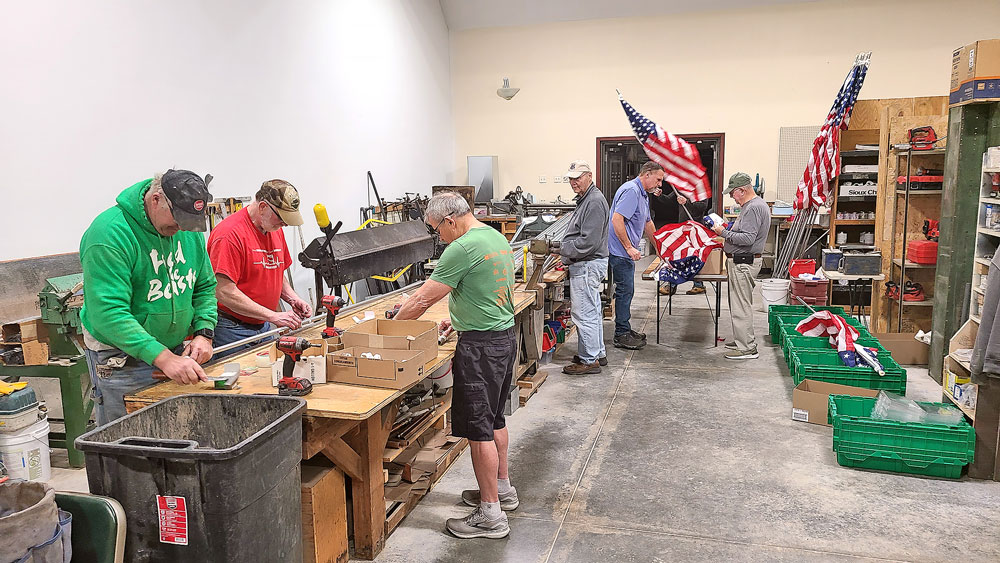Charles City broadband board regroups, looks for a way forward
By Bob Steenson, bsteenson@charlescitypress.com
Members of the Charles City Telecommunications Board started a process of re-examining their fiber optics broadband project this week with the hope of finding a way forward after “hitting pause” last month.
Part of the process will include looking for different ways to use financing, as well as simply seeing how financial markets are changing.
But the process will also include looking at the system itself, such as the scope of the project, the proposed services, the timeline and more.
Trustees Chairperson Cheryl Erb said the meeting last month — one where the agenda included a number of important steps including approving financing, hiring a general manager and awarding a construction project, but where none of that occurred — “was a tough meeting.”
After delays of several months while the board’s consultants tried to line up financing for the project that eventually topped out at $22 million, they said at the Nov. 19 meeting that they couldn’t find financing on terms that would work.
A number of factors have been identified, they said, and one of them was the impact that COVID-19 has had on the financial markets.
Todd Kielkopf, president of Kielkopf Advisory Services LLC of Des Moines, is a consultant who was hired by the telecommunications board to help with the transition from a business plan to operations.
In September the board had designated Kielkopf as the interim general manager to help with planning until a general manager was hired — a process that was also delayed while awaiting financing.
At the meeting this week, the telecom board revised Kielkopf’s contract. He will now work without pay until the utility approves financing to proceed with the project.
“I am not going to be billing Charles City to help do this effort, until such time — we’re just going to track the time until it’s financed. And that’s fine with me,” he said.
Kielkopf said the market to finance debt for new business startup enterprises, particularly in smaller Iowa communities, was not as favorable as when the project began looking for lenders.
Local financing sources and investors willing to invest in a bond issue are relatively low, relative to the size of the project, he said, and the eventual $22 million size of the proposed debt issue was perceived to be high per capita compared to similar projects.
Erb said one of the questions that a lot of people have been asking is how the project got to $22 million.
Kielkopf said the plan started being estimated in the $11 million to $13 million range, and grew to $14.7 million as the business plan was developed to include all the services and how they would be provided.
Michael Maloney, senior vice president with D.A. Davidson & Co. of Des Moines and one of the consultants who helped try to find financing, said the kind of financing that was going to have to be used ballooned the price.
It was originally intended to used local and regional banking for much or most of the financing, he said. That funding can be drawn on monthly as needed, so there isn’t as much interest that needs to be covered in early years.
But timing played a large role in how things turned out, Maloney said. A number of other municipal broadband utility projects in the state had started before Charles City and had used up a lot of the available capital for that type of investment, and a lot of that was before COVID-19 hit.
The involvement of local banks in the Paycheck Protection Program (PPP) to help businesses affected by COVID-19 “ate up not just a ton of horsepower but also capital from the investor market,” Maloney said. And the uncertainty regarding those loans and the futures of the businesses they went to added to the hesitancy of local financing sources to make loans on a startup project like a broadband utility.
Maloney said when it became apparent that local financing would not be available they shifted to the revenue bond market, and that type of borrowing requires borrowing a much higher amount up front to cover interest payments and required reserves.
“The main piece is just the reserve fund sizing. You need to have reserve funds, and separate funds by series, sufficient to cover the maximum years’ payment. That’s something that’s standard procedure in the bond market, but would typically not be required from the bank lending market. That’s just an apples and orange difference,” he said.
“The net impact on a bond issue is negligible. It pays down the last year or two years of debt. From that long-term cash-flow standpoint it’s a wash, but it does add to the sizing upfront,” Maloney said.
Kielkopf said they have laid out a process to work to make the fiber project financially viable.
That includes finding additional sources of operating revenue such as partners on the fiber line from Mason City to Charles City that will provide internet access, and possible public-private partnerships on the broadband system itself.
One concern with partnerships is making sure the system retains local control, because that’s one of the reasons behind building a municipal broadband utility, Kielkopf said.
The board will seek feedback on the debt size from the investment community in Charles City and the regional banking industry, to better understand how potential investors see the risks and to restructure reserves and interest rate projections, he said.
And it will see if there are other financing sources available and whether lending market conditions improve.
Another step will be to look for strategies to repay the $1.2 million the board borrowed from the city of Charles City for planning and start-up costs and that has mostly been spent.
Kielkopf said one of the keys will be the board getting direct feedback from the local financial and investment community before doing any modification of the plans for the broadband system.
Chip Baltimore, an attorney and former Iowa legislator who is a senior fellow of the Taxpayers Protection Alliance and who has been a regular critic of municipal broadband systems, asked during a public comment part of the meeting that the board “be completely up front” with the residents of Charles City.
“There needs to be a more complete explanation of what you’re being told and when you’re told it, and what’s going on here, because it seemed as this project went on despite some warnings clear back in 2019 about the perils of what you were undertaking. The costs kept going up. The borrowing needed kept going up,” Baltimore said.
“There seems to be an expectation that there might be some culpability here somewhere,” he said, asking again that the board share information about what the consultants have been saying, “not … just the rosy part, but disclose the stuff that’s not so rosy. I just think it’s at that point now that the public deserves to know what’s going on.”
The next meeting of the board will be 4 p.m. Tuesday, Dec. 22. Meetings are held via Zoom teleconference.








Social Share